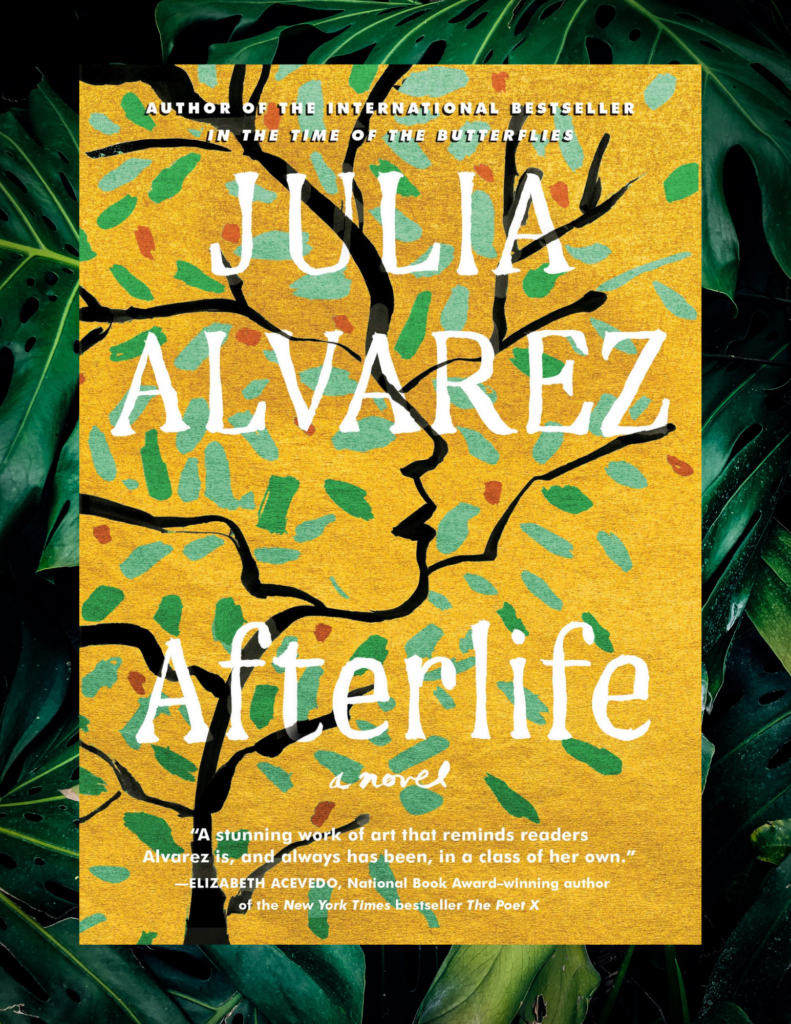Afterlife is Julia Alvarez’s latest novel for adults, after a hiatus of nearly fourteen years. Alvarez was born in New York but she had spent a part of her childhood in the Dominican Republic. I enjoyed her novels, be it the historical novel, In the Time of the Butterflies, a fictionalized account of the Mirabal sisters during the Trujillo dictatorship in the Dominican Republic; her personal and biographical novels like How the García Girls Lost Their Accents that narrates the story of a family that flees their home in the Dominican Republic to live in the US, the teen novel Before We Were Free that shows the growth of a young girl in the Dominican Republic, or ¡Yo! that explores the writing world and family roots; or even her young adult novel that deals with undocumented immigrants like Return to Sender.
So, obviously I was excited to read Afterlife and it did not disappoint. Antonia, a recently retired college English Professor, is grieving the loss of her husband, Sam. She has the support of her three sisters, Izzy (Felicia), Tilly (Matilda), and Mona (Ramona), and tries to understand her life, after the sudden death of Sam. There are two other stories. One is the sudden disappearance of Izzy and how the sisters search for her. The other is the story of Estela, who is an undocumented immigrant and who comes to live with her fiancé, Mario. Mario, is also undocumented and works for Antonia’s next-door neighbor, Roger.
Alvarez is an expert on writing about immigration, mainly because of her own struggles in the Dominican Republic and her immigration to the US. Her stories also portray the struggles of undocumented immigrants. Afterlife is no exception. Antonia, who had immigrated with her family, understands her privilege after marrying a White doctor, as well as getting a college education that resulted in her residence in rural Vermont, where she “ended up teaching Americans their own language.” Antonia tries to do what Sam would have done if he was alive, be it arranging for Estela or doing the right thing.
Antonia and her sisters are also memorable. Their Latina sisterhood is beautifully described with the flaws that siblings have, “Conflict is their modus operandi. Comparing, competing, bickering, issuing epithets, condescending ringtones, you name it, and at the same time, utterly loyal and bound to each other.” Antonia struggles with her identity, be it among her sisters or her neighborhood in Vermont. The debate on immigrants is explored in details- the fact that Roger does not like immigrants but has employed them on his farm seems to a contradictory reality for many Americans.
I enjoyed the novel in spite of Antonia’s sadness. The themes of sisterhood, identity, and immigration, struck a chord with me. It asks questions about what we can do to help others, how we can survive in a broken world, and how to find oneself. Immigrants are expected to and they do assimilate, but Antonia’s questions lingers, “If I try to be like you, who will be like me?”


